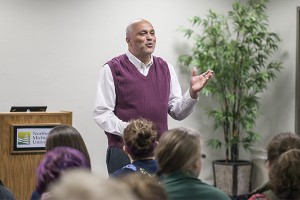Dr. David Pilgrim, vice president for diversity and inclusion at Ferris State University and founder of the Jim Crow Museum, spoke on campus Tuesday, March 24, about whether our American society is post-racial.
Dr. Pilgrim is an expert on multiculturalism and diversity. His museum at Ferris State University takes an aggressive approach at teaching tolerance by displaying elements of racism from America’s past. The museum places propaganda from Jim Crow era segregation and puts them on display for the public. He has done countless interviews and speeches for sources such as Time magazine and The New York Times.
Pilgrim’s speech at NMU centered on the development of our society’s racial consciousness. During the speech, Pilgrim talked about some of his life experiences as well as our countries experiences with racism, mentioning how diversity has progressed over the years.
Rachel Harris, the director of the Center for Student Enrichment, said universities can contribute to a diverse society.
“For many students at NMU, college is one of the first times they’ve had the opportunity to have real interactions with people from diverse backgrounds,” Harris said. “It is critical to have a sensitivity to differences and the ability to relate to people with different backgrounds.”
Along with diversity’s development, Pilgrim described comedic and critical elements of racial issues for the audience to relate to before diving into his main focus. Pilgrim defined post-racial as “a society where people notice race but are not punished or mistreated because of race.” He suggested that despite being more open about race than our country has ever been before, it is not a post-racial society just yet. Pilgrim cited events in our history that planted the seed of a post-racial society but overall have not completely created it.
These events have made some Americans believe that we live in a post-racial society because of the positive impact they’ve had on the country. Events such as the integration of Jackie Robinson into Major League Baseball, the abolishment of anti-miscegenation laws, and largely, the election of Barack Obama as president has made some believe that we indeed live in a post-racial society because of our country’s major cultural changes.
Dr. Pilgrim argued that although some may not see the evidence to suggest otherwise, there are still inequalities in our society. The animated Pilgrim presented a PowerPoint that described in detail statistics that suggest that our society is yet to be post-racial.
Staggering statistics like the percentage of African Americans in the country, 12 percent, versus the percentage of African American’s in prison, 44 percent, silenced the audience. He went on to discuss the different viewpoints in our society and their opinionated area to send the blame. Conservatives blame the people, whereas liberals blame the system, but Pilgrim stated that sociologists like him recognize the patterns that led to such staggering statistics. These patterns include an increase in the arrests of African Americans during the war on drugs, despite their lack of drug use statistically.
Pilgrim also noticed patterns such as the increase in African Americans being killed by armed officers. This lead Pilgrim to say that “we are more democratic today than we’ve ever been but we still have challenges. The term post-racial is an enemy of communication.”
“Instead of pursuing a post-racial society we should be pursuing a post-racism society,” said Pilgrim.
He emphasized that we can do this by having intelligent, sustainable discussions with one another about race relations. Pilgrim stressed diversity and pluralism as the keys to this societal machine.
“Diversity is where we don’t have to sit at the same table, but the table should be open to all,” Pilgrim said. “We should recognize race in our society.”
Graduate student TJ Aiyash, who is also the graduate assistant in the Multicultural Education and Resource Center, said Pilgrim’s speech made an impact on students attending.
“Why I’m glad he came is because we’re looking to hire somebody like him for campus, so this conversation can be happening at Northern,” Aiyash said.
Dr. Pilgrim ended his speech with a statement encouraging others to continue the conversation.
“A speaker can spark the fire,” Pilgrim said. “But he can’t keep the embers burning.”





























